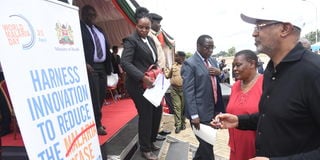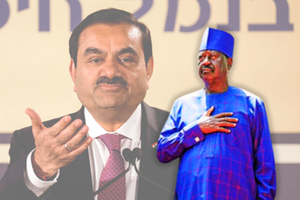Kenya drafts 10 Cuban experts in Sh24 billion malaria war deal

Health Chief Administrative Secretary Rashid Aman (right) is received by Kakamega County Health executive Recho Okumu
during World Malaria Day commemoration at Bukhungu Stadium on April 25, 2022.
The Ministry of Health (MoH) has dispatched 10 Cuban experts to Kakamega, Siaya, Kisumu, Bungoma, Busia, Vihiga, Homa Bay and Migori counties in the fight against malaria with biological methods.
This comes after Health Cabinet Secretary Mutahi Kagwe and Cuba’s public health minister Jose Angel Portal Miranda inked a deal in June for 101 health specialists to work in Kenya under a two-year anti-malaria programme.
The experts will start working between May and June, said Dr George Githuka, the head of the National Malaria Control Programme at the ministry.
“The experts are here and the project is ongoing. We have procured biolarvicides and have already done all the preparatory activities, including talking to communities. Actual spraying will start between May and June,” Dr Githuka said.
According to the US National Library of Medicine, “Biolarvicides, based on mosquitocidal toxins of certain strains of Bacillus sphaericus and Bacillus thuringiensis var israelensis H-14 (Bti), are highly effective against mosquito larvae at very low doses and safe for non-target organisms”.
Expensive process
Experts also say using larvicides can be an expensive process that requires the inclusion of many specialists and local volunteers to execute.
The larvicide initiative is part of a medical exchange programme between Kenya and Cuba that saw about 50 Kenyan doctors sent to study in the Caribbean country. They have returned and have been deployed to hospitals around the country.
The World Health Organization (WHO), in a report, cautioned against the use of larvicide to control malaria in sub-Saharan Africa, explaining that the chemicals should be used “only in areas where the breeding sites are few, fixed and findable”, and those are rare in Africa.
The WHO says there are other more cost-effective ways of fighting malaria. But Health Chief Administrative Secretary Dr Rashid Aman earlier this week said Cuba eliminated malaria in 1973 mainly by spraying mosquito breeding sites with larvicides.
Endemic lake counties
“Cuban experts have been deployed to all the eight endemic lake counties and will work with our health teams for two years within which they will transfer their skills to our malaria control experts,” he noted.
“Larviciding will go a long way in accelerating our efforts towards malaria elimination in this region and Kenya.”
Dr Aman said the National Treasury had allocated another Sh800 million to the Health ministry to boost the fight against malaria. He added that in 2021, the national government, in partnership with counties, distributed 16 million insecticidal nets, targeting vulnerable pregnant women and children.
Officials at the Health ministry did not disclose the employment terms for the Cuban experts. Besides lucrative salaries in deals inked with governors, Cuban doctors who served on contract in Kenya were given luxurious furnished homes, airfare for holidays, paid utilities and transport.





